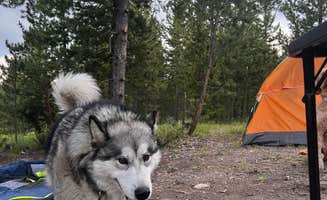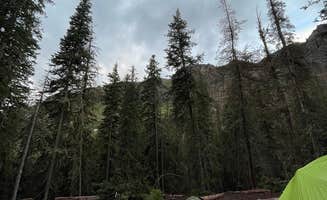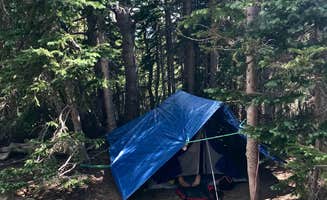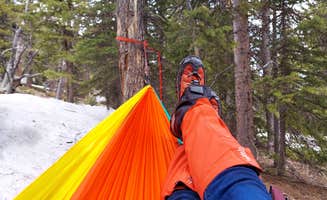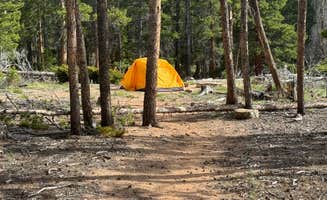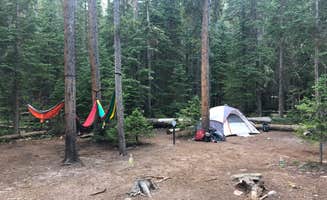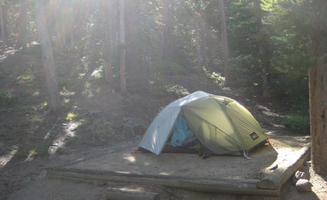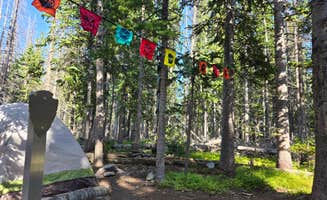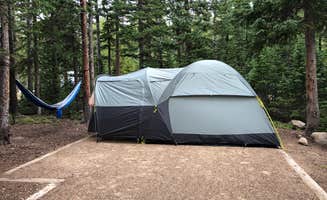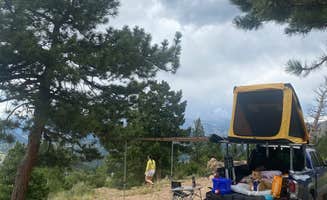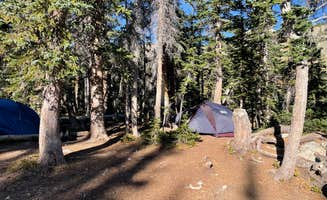Tent camping near Grand Lake, Colorado ranges from high-elevation backcountry sites to accessible dispersed areas within Arapaho National Forest. Sitting at approximately 8,400 feet elevation, the area experiences cool summer nights with temperatures often dropping into the 40s even during July and August. Many campgrounds remain snow-covered until late May, with dispersed areas becoming accessible earlier than higher elevation backcountry sites.
What to do
Mountain biking trails: Several campsites offer direct access to mountain biking paths. At Stillwater Pass Dispersed Campsite, "We found a great camping spot close to a hiking/biking trail. The flowers are absolutely gorgeous and the Columbine flower is scattered amount the wildflowers," reports camper Amie M.
Wildlife viewing: Early mornings provide optimal wildlife spotting opportunities. Near Allenspark Dispersed Camping, campers regularly encounter large mammals. "The second day staying there we ran into a bear and scared him off. Two hours later he can back and we scared him off again," notes Ben O., highlighting the importance of proper food storage.
Creek access: Many tent sites feature proximity to water sources. Brett A. describes Allenspark: "It was gorgeous! Lots of spots, and also lots of people. Some folks coming in late night. It's definitely a bumpy ride in." The sound of rushing water provides natural white noise for sleeping.
What campers like
Proximity to Grand Lake town: Tent campers appreciate the balance between wilderness and convenience. "Very close to Grand Lake and Rocky Mountain National Park. Didn't look like there were too many spots but the spots I did see were nice. Had no trouble finding a spot on a Sunday evening," notes Bobby J. about Stillwater Pass Dispersed Camping.
Lake access: Sites near water bodies remain popular throughout summer months. One camper at Sandbeach Lake Backcountry Campsite shares: "The sandy beach is amazing! We were able to spend the day sunbathing, swimming, and taking in the beautiful views."
Fire rings at select sites: Despite fire restrictions in many areas, some dispersed camping areas maintain established rings. At Allenspark Dispersed Camping, Ben D. notes: "This was our first time dispersed camping and we loved it! The road was pretty mild but on up gets a lot more rough! The pull offs are great and most of them have fire rings."
What you should know
Permit requirements: Backcountry sites within Rocky Mountain National Park require advance permits. One visitor to Goblin's Forest explains: "This site (and all Rocky Mountain National Park wilderness sites) is reservation only. Reservations can be made by searching 'Rocky Mountain National Park Wilderness Permits' on Recreation.gov. The price per permit is $36."
Bear safety practices: Wildlife encounters occur regularly around Grand Lake. Hard-sided containers are essential. "A huge bear got into my tent while I was gone for 2 hours and absolutely destroyed it. So I had to leave and didn't get to enjoy the night under the stars," reports Renee at Allenspark Dispersed Camping.
Weather considerations: Afternoon storms frequently develop, particularly during summer months. Camp setup should be completed early. One visitor to Goblin's Forest notes: "Unfortunately, we ran into some bad weather (downpour, hail, thunder, lightning) but we were able to get our tent up in time, so the card games began!"
Tips for camping with families
Accessibility factors: When tent camping with children, consider hiking distances. At Goblin's Forest, Molly Y. shares: "We hiked to Goblin's Forest Campground from the Longs Peak Trailhead. This is a quick, uphill hike that is approximately 1.2 miles."
Site spacing awareness: Family groups should consider campsite proximity to others. "The campground has 6 backcountry camping sites and 1 latrine. The latrine is the first thing you see when hiking into the campsites. The campsites are fairly close to each other. We were able to see 2 other sites from ours," notes the same Goblin's Forest visitor.
Seasonal wildflower viewing: Timing family tent camping trips with wildflower blooms creates educational opportunities. A visitor to Stillwater Pass notes even after forest fires, natural beauty persists: "Even though this forest was impacted by the troublesome fire in 2020, this place is still very beautiful... The flowers are absolutely gorgeous."
Tips from RVers
Road condition alerts: RV tent campers should assess access roads before attempting passage. At Hermits Hollow Campground, one camper advises: "The road is okay to drive on, we took our car and tent camped. We didn't take our camper as the switchbacks are very tight and the road is very steep."
Bear box usage: Even RVers should utilize provided bear storage. "The park provides every spot with a table, fire ring and bear box. The bear box is for more than just food. If you have anything that smells good, the animals (not just bears) WILL try to get into your vehicle to steal it. Sprays, lotions, deodorants... etc," notes Daisee Mae S. at Hermits Hollow.
Limited level sites: Finding level spots for larger rigs presents challenges. At Stillwater Pass, Steve M. observes: "Not at all a beautiful area, only a few places to camp and it's a bumpy road and the access points are not good, none of the sites are level."


